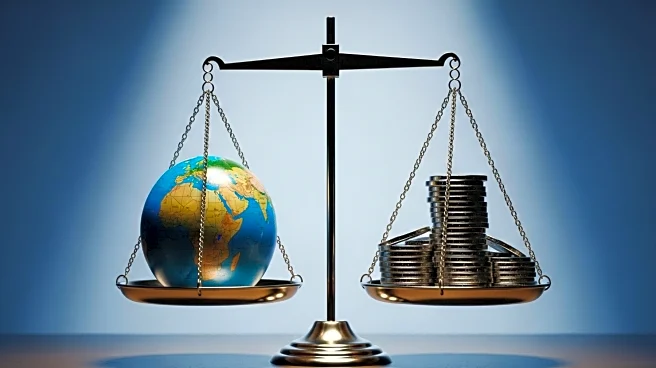What's Happening?
The United States has recently implemented a $100,000 fee for new H-1B visa petitions and a 100% tariff on branded and patented pharmaceutical imports. These measures are framed as job protection strategies but reflect a broader trend of protectionism and demographic anxiety in the developed world. In response, India, under Prime Minister Narendra Modi, is focusing on strengthening its economy through scale, skill, and self-reliance. This approach aims to counteract global turbulence by leveraging India's youthful population and economic reforms. Recent data shows India's GDP forecast for FY26 at 6.8%, with strong domestic demand and investment flows. Additionally, India's foreign-exchange reserves have reached $700 billion, and remittances are up, indicating robust economic health.
Why It's Important?
The U.S. tariffs and visa fees could significantly impact international trade and labor mobility, affecting industries reliant on skilled foreign workers and imported pharmaceuticals. India's strategy to bolster its economy through self-reliance and skill development could position it as a key player in the global market, potentially offsetting the negative impacts of U.S. protectionism. This shift may lead to increased investment in India and strengthen its role as a global economic engine. The measures taken by the U.S. could lead to strained trade relations, while India's focus on internal growth could enhance its economic resilience and global competitiveness.
What's Next?
India is expected to continue its focus on economic self-reliance and skill development, potentially expanding its influence in global markets. The U.S. may face international criticism for its protectionist policies, which could lead to diplomatic negotiations or adjustments in trade agreements. As India strengthens its economic foundations, it may seek to forge new partnerships and expand its export markets, further integrating into the global economy. The ongoing trade talks between India and the U.S. could result in agreements that address mutual concerns and foster economic collaboration.
Beyond the Headlines
The U.S. protectionist measures highlight a growing trend of economic nationalism, which could have long-term implications for global trade dynamics. India's response, focusing on self-reliance and skill development, reflects a strategic shift towards sustainable growth and global engagement. This approach may influence other nations facing similar challenges, promoting a model of economic resilience and adaptability. The cultural and ethical dimensions of these developments underscore the importance of balancing national interests with global cooperation.










